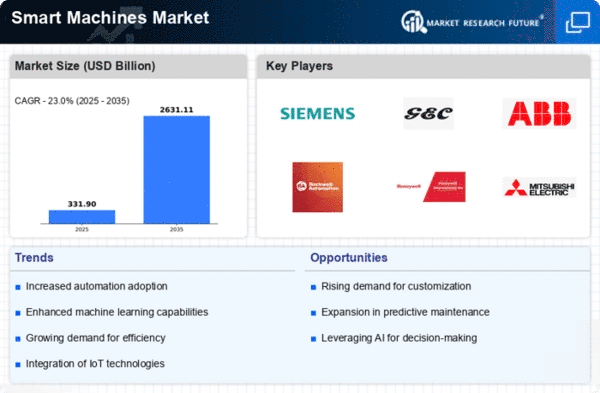Market Trends
Key Emerging Trends in the Smart Machines Market
The Smart Machines Market is experiencing noteworthy trends that reflect the rapid evolution of artificial intelligence (AI) and automation technologies. One prominent trend is the widespread adoption of smart machines across various industries. From manufacturing and healthcare to finance and logistics, organizations are leveraging smart machines to enhance operational efficiency and productivity. These machines, equipped with advanced sensors, AI algorithms, and machine learning capabilities, are capable of autonomous decision-making and adaptation, leading to improved workflows and reduced human intervention.
One of the key growth patterns identified in the smart machines market is incorporation of robotic systems with AI to build intelligent robots. Such robots are able to perform detailed operations along with human staff as they can understand surroundings and constantly adapt. This phenomena are mainly observable in manufacturing whereby precision assembly, quality control and logistics; these are facilitated through the smart robots. Productive processes through the incorporation of smart machines are not only becoming more organized but also increasing safety and adaptability in terms of dynamic environments.
In another area, the market is also seeing an increase in the use of intelligent machines and particularly – smart machines that work in healthcare. Our modern world is powered by many AI diagnostic tools, robotic surgery systems and smart medical devices. They provide the basis for revolutionary changes in patient care and treatment. The drive towards smart healthcare machines minimizes the risk of making errors in diagnostics, individualized treatment options using various complicating factors and considerations such as genetic predisposition that are commonly found to be embedded within a given pathological process depending on patient’s features, distant monitoring of patients. The current healthcare services linkers are smart machines, which help to optimize interventions around faster and more accurate health care service provision.
In addition, the Smart Machines Market shows a trend to edge computing which is used in robotics and automation. Processing data enabled by edge computing means that smart machines have the capability to process data received locally, thus reducing latency and real-time decision-making. This pattern is essential in implementations where prompt reactions are vital, for example, independent vehicles and drones’ foundation mechanized manufacturing. The migration of processing to edge computing, increases the independence and responsiveness of smart machines, which makes them more valuable for various tasks where their working conditions constantly change rapidly. While these trends indicate the positive trajectory of the Smart Machines Market, challenges remain. Concerns related to job displacement, ethical considerations in AI, and the security of AI-driven systems need to be addressed for the responsible development and deployment of smart machines. Additionally, the complexity of integrating diverse technologies into cohesive smart systems poses implementation challenges that require careful consideration.

















Leave a Comment